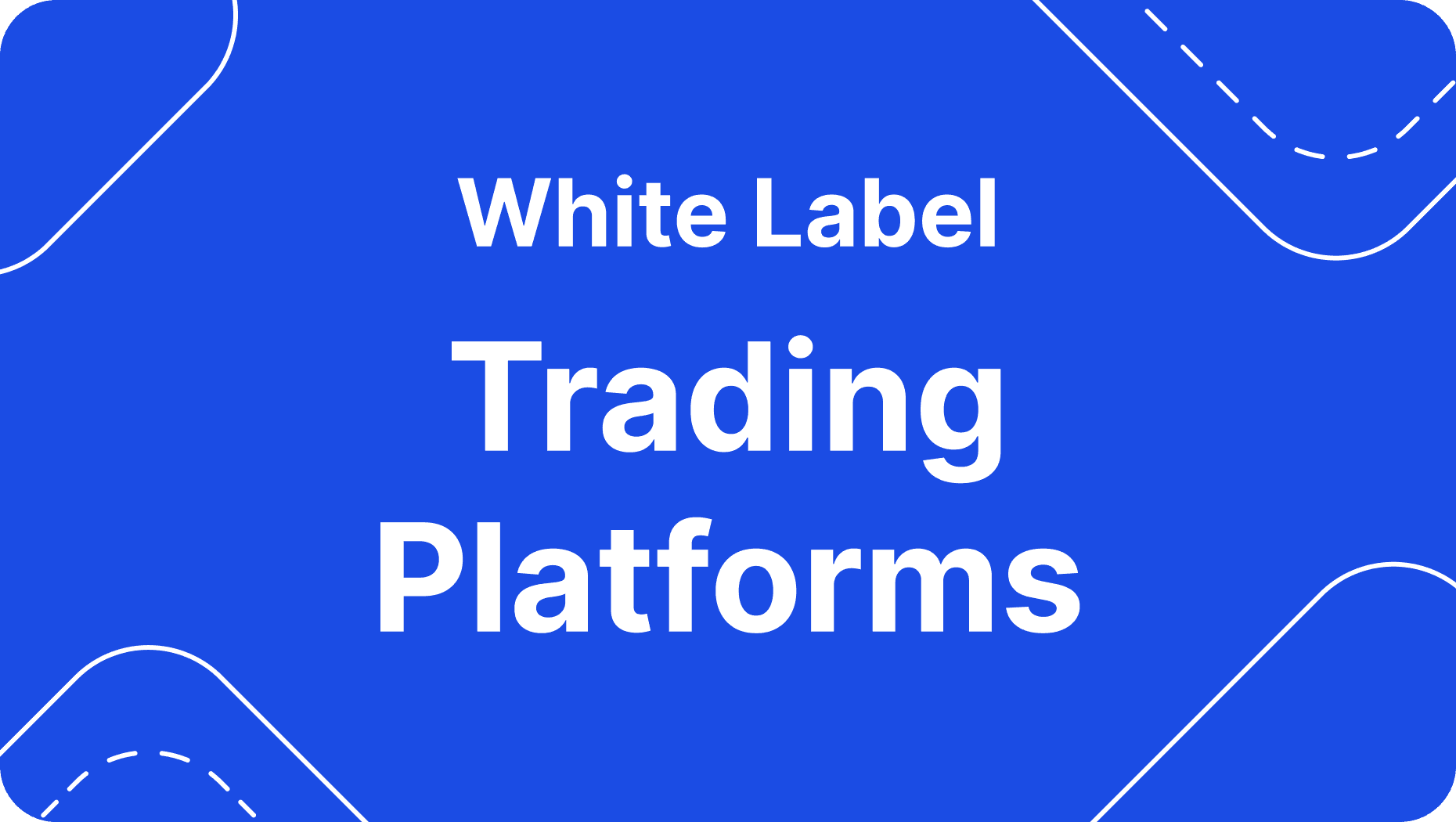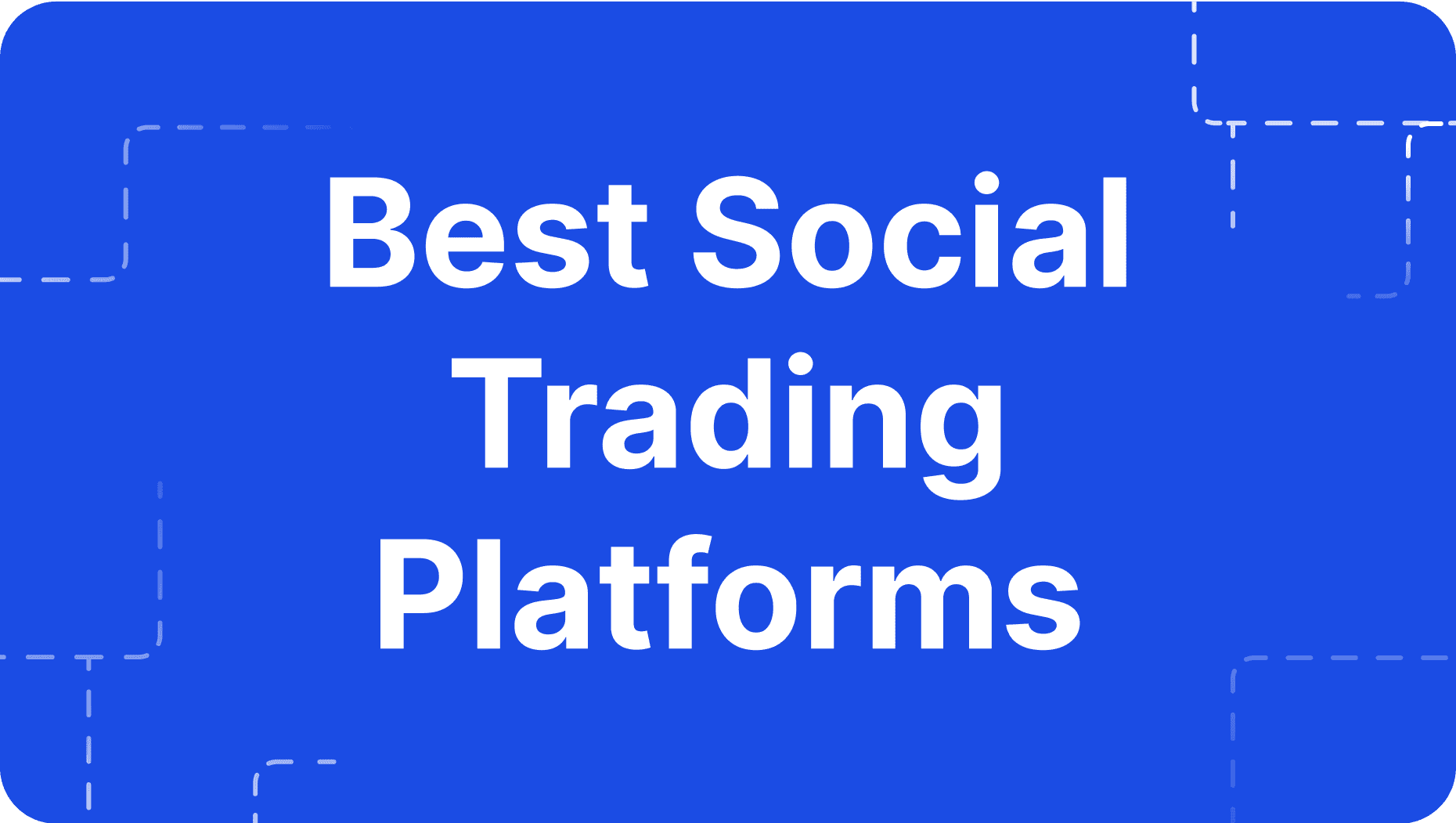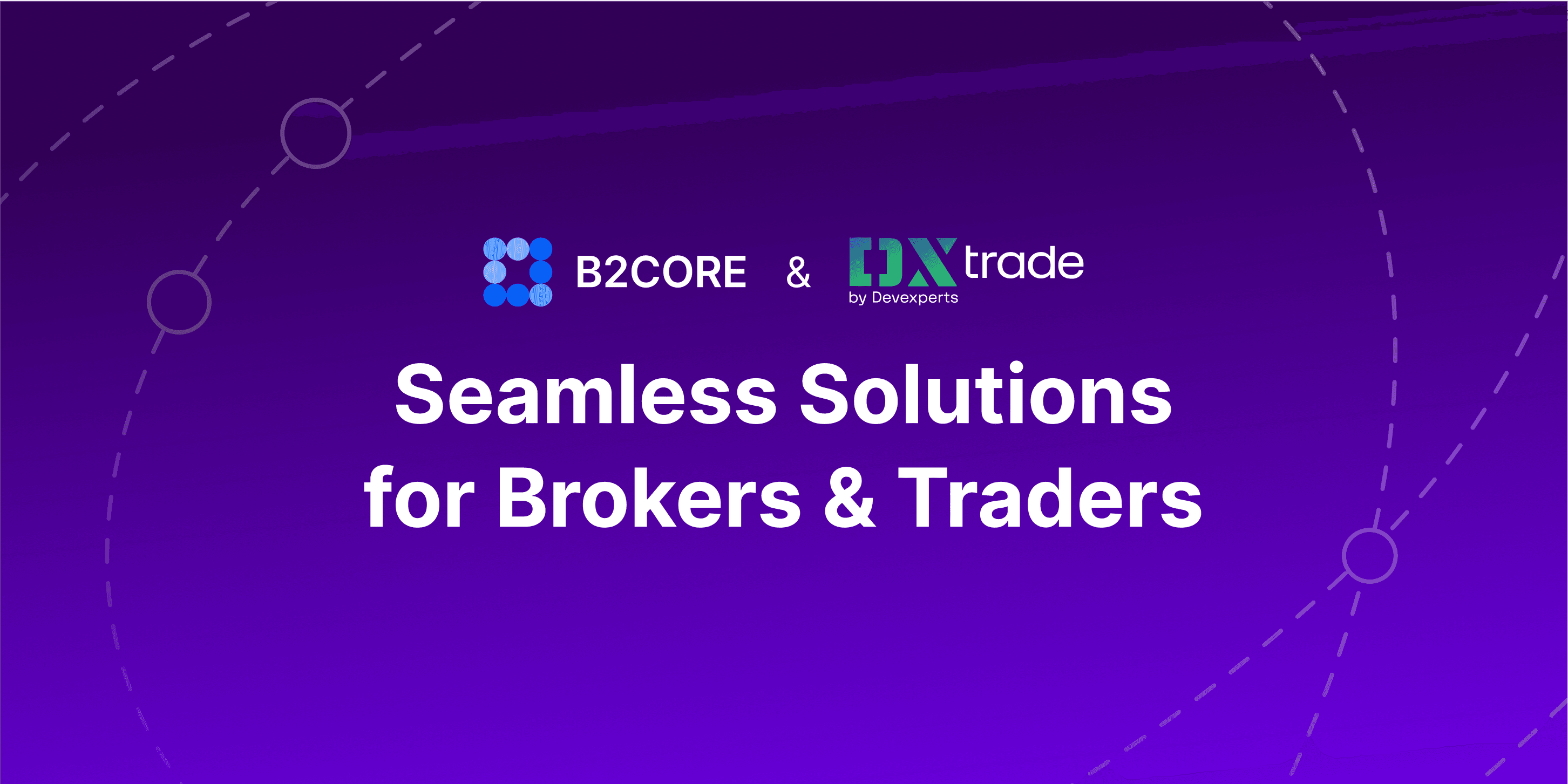مشاركة
0
/5
(
0
)
بات الدخول إلى قطاع الخدمات المالية كعمل تجاري أكثر صعوبة من أي وقت مضى، إذ تشتدّ المنافسة في الوقت الحاضر. يتطلّب إنشاء منصة وقتًا طويلاً ومعرفة واسعة وموارد بشرية كبيرة. لهذا السبب، أصبحت حلول الوايت ليبل خيارًا شائعًا.
في هذه المقالة، نلقي نظرة على أفضل 5 منصّات وايت ليبل للتداول لعام 2025. ولتزويد الشركات بأسسٍ لاتخاذ قرارات مستنيرة، يتم تقييم كل منصة وفقًا لأبرز ميزاتها وتقنياتها وبروتوكولات الأمن واتجاهات السوق.
أهم النقاط
توفّر منصّات الوايت ليبل حلولًا جاهزة تسهّل دخول الوسطاء إلى الأسواق.
يمكن للشركات تكييف المنصة وفق احتياجاتها ومتطلباتها من خلال خيارات تخصيص متنوعة.
تقدّم منصّات الوايت ليبل أدوات تداول متقدّمة وتدعم عدة أنواع من الأصول.
التعريف والنظرة العامة
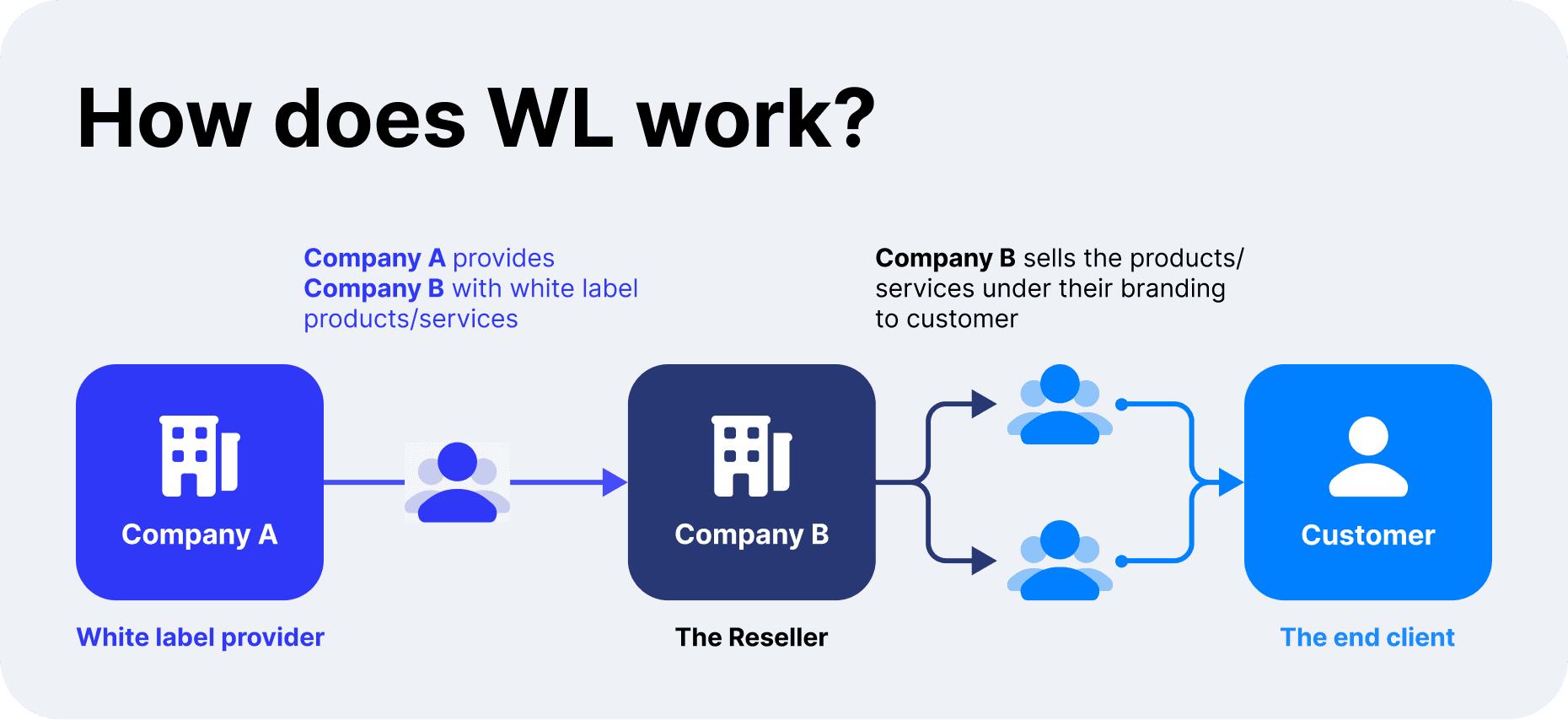
بشكل مبسّط، تُعد منصّات الوايت ليبل للتداول برامج برمجية جاهزة للشركات المالية والوسطاء. تتيح هذه المنصّات للشركات تقديم خدمات التداول باسمها الخاص عبر تخصيص أدوات وميزات وأسلوب المنصّة. توفّر حلول الوايت ليبل استراتيجية جاهزة تقلّل التعقيد التقني وتسمح بإطلاق سريع في السوق.
توفّر هذه المنصّات أساسًا متكاملًا في العادة، يتضمّن أدوات لإدارة المخاطر ودعمًا لعدة عملات، بالإضافة إلى التكامل مع مزوّدي السيولة. يعيد الوسطاء تصميم المنصة بهويتهم الخاصة (شعارهم، لوحة الألوان، والميزات الفريدة) لتقديم تجربة سلسة للعملاء.
تشمل بعض الفوائد الرئيسية دخولًا أسرع للسوق، وانخفاض النفقات التشغيلية، والتركيز بصورة أقوى على اكتساب العملاء والاحتفاظ بهم. توفّر حلول الوايت ليبل كفاءة تشغيلية وقابلية للتوسّع عبر تمكين الشركات من تجنّب عمليات التطوير المكلفة. تساعد الميزات المتقدمة، مثل بيانات السوق اللحظية وأدوات التداول الخوارزمية، الوسطاء وشركات الاستثمار على الحفاظ على قدرتهم التنافسية.
على سبيل المثال، لنفترض أنك ترغب في إطلاق شركة وساطة. فريقك قوي، واستراتيجية عملك متينة، وفكرتك رائعة. لكنك تفتقر إلى الوقت والمال اللازمين لبناء منصة تداول من الصفر.
هنا يبرز دور منصّة الوايت ليبل، إذ توفّر لك منصة جاهزة تحتوي على كل الميزات الضرورية:
إدارة الحسابات: يمكن للعملاء إنشاء حساباتهم والوصول إليها.
أدوات التداول: يستطيع العملاء تتبع استثماراتهم وتحليل الرسوم البيانية وإدخال الأوامر.
معالجة الدفعات: يمكن للمستخدمين إجراء الإيداعات والسحوبات.
خدمة العملاء: يتلقى العملاء الدعم والإرشاد.
بعد ذلك، يمكنك تعديل المنصة بما يلائم علامتك التجارية:
العلامة التجارية: إضافة ألوان شركتك وخطوطها وشعارها.
الميزات: إضافة أو حذف مزايا بناءً على الجمهور المستهدف.
التكامل: ربط نظامك المحاسبي أو نظام إدارة علاقات العملاء (CRM) بالأنظمة الأخرى.
باستخدام منصّة وايت ليبل، يمكنك إطلاق نشاطك في الوساطة بشكل أسرع وبتكلفة أقل بكثير. لن تقلق بشأن التعقيدات التقنية المرافقة لإنشاء منصة من البداية. بدلًا من ذلك، يمكنك التركيز على نقاط قوتك، مثل استقطاب العملاء وتقديم خدمة عملاء متميزة.
معايير اختيار المنصة
قبل أن نتعمّق في قائمة أفضل منصّات الوايت ليبل للتداول، من الضروري معرفة الخصائص والعناصر التي يجب التركيز عليها.
التقنية والموثوقية
يجب أن تتميّز المنصّات بالاستقرار ووقت التشغيل العالي للتعامل مع ظروف السوق بكفاءة. تضمن التقنيات المتقدّمة أداءً سلسًا وإجراءات أمان قوية لحماية البيانات والمعاملات.
خيارات التخصيص
تمكّن المنصّات التي تقدّم حلولًا مخصّصة وهوية تجارية الشركات من مواءمة خدمات التداول مع أهدافها. تشمل أمثلة خيارات التخصيص واجهات استخدام سهلة، وأدوات مرنة، وتكاملًا سلسًا مع الخدمات الخارجية.
الامتثال للقوانين
يجب أن تدعم حلول الوايت ليبل الامتثال التنظيمي في عدة دول. يشمل ذلك الامتثال لإرشادات حماية البيانات ومتطلبات التراخيص الخاصة بشركات الاستثمار الدولية.
قدرات التكامل
يعدّ التكامل مع أدوات التحليلات وخيارات الدفع وإدارة علاقات العملاء (CRM) أمرًا أساسيًا. وتسمح عمليات التكامل المتنوّعة للشركات بالتكيف مع ظروف السوق والحفاظ على الكفاءة التشغيلية.
خدمة العملاء
يقدّم المزوّدون دعمًا متواصلًا على مدار الساعة وبعدة لغات لمساعدة الشركات في الحفاظ على تجربة مستخدم سلسة. وتُعد المواد التعليمية والدعم الفني عناصر حاسمة للنجاح على المدى الطويل.
هيكلية التكلفة
ينبغي أن تتسم هياكل التسعير بالشفافية، بما في ذلك رسوم الإعداد واتفاقيات مشاركة الإيرادات والتكاليف المستمرة. تحظى الحلول الموفّرة للتكلفة بأهمية للشركات التي تبحث عن حل يمكن توسيعه مع نمو المؤسسة.
إجراءات الحماية
تعدّ ميزات الأمان المتقدّمة، مثل المصادقة متعددة العوامل وآليات حماية البيانات، حاسمة للعمل في السوق وجذب العملاء إلى المنصة.
تغطية الأصول
ينبغي أن تدعم منصّات تغطية الأصول التداول عبر فئات أصول متعددة، مثل الأصول الرقمية وأزواج التداول والمنصّات اللامركزية. تحظى الحلول الشاملة بجاذبية لدى المتداولين المحترفين والشركات الراغبة في التوسّع.
النمو وقابلية التوسّع
تضمن الحلول الجاهزة المزوّدة بتقنيات متطورة وميزات تعتمد على البلوكشين قابلية التوسّع. يجب أن تلبّي المنصّات احتياجات الشركات الراغبة في المشاركة في قطاع العملات الرقمية سريع التطور.
تجربة المستخدم
تعدّ تجربة المستخدم السلسة والتصميم البديهي أمرًا ضروريًا لجذب المستخدمين وتزويد العملاء برؤى مفيدة لاتخاذ قرارات حكيمة.
أفضل 5 منصّات وايت ليبل للتداول في عام 2025
يبقى اختيار مزوّد البرمجيات الأفضل لمنصّات الوايت ليبل للتداول أمرًا متروكًا لك بحسب احتياجاتك. فيما يلي بعض من أبرز المزوّدين:
cTrader White Label
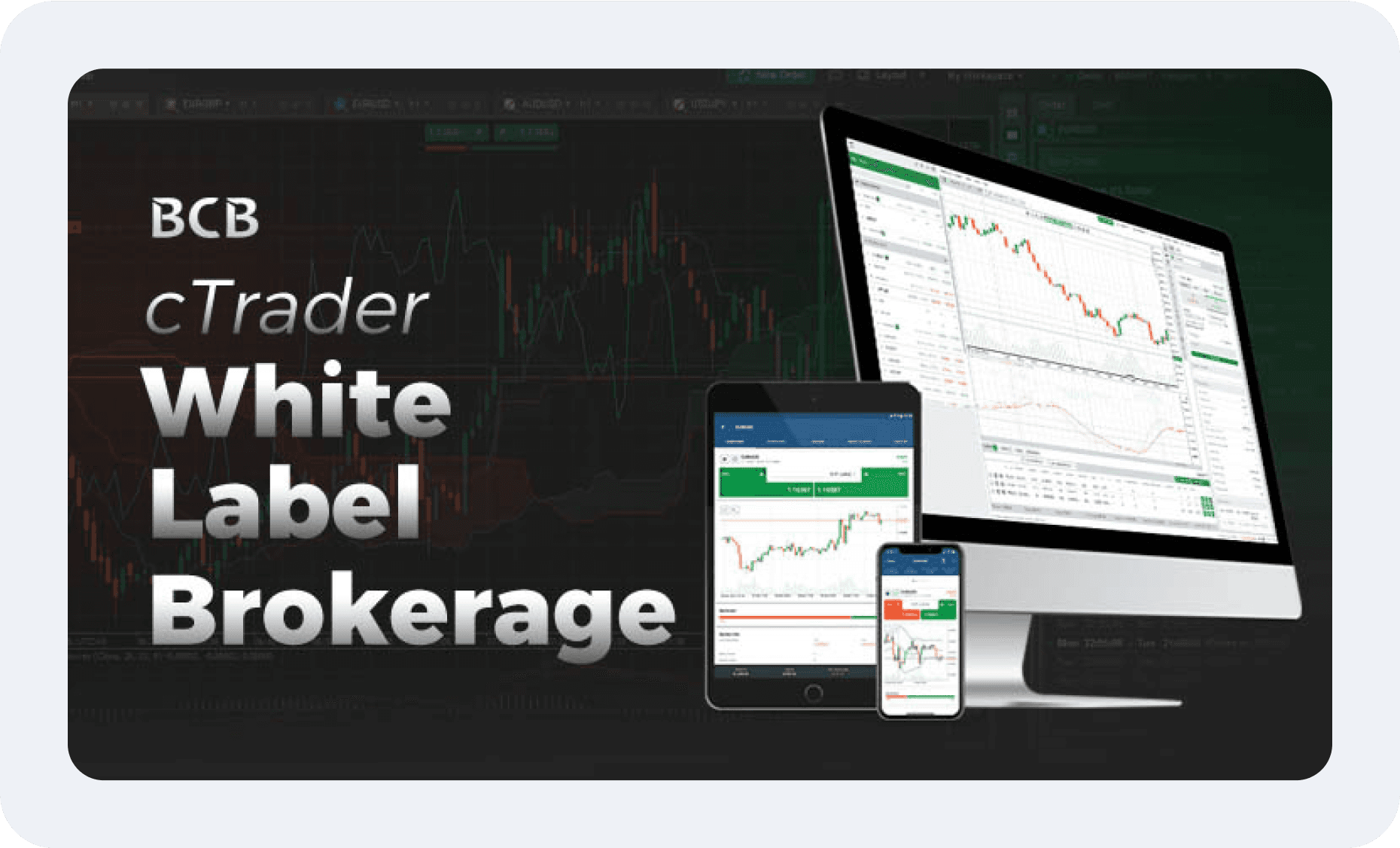
cTrader White Label يقدّم حلًا مخصّصًا للوسطاء الذين يركّزون على عدة فئات أصول، مثل الفوركس والعقود مقابل الفروقات (CFDs). تدعم المنصّة استراتيجيات تداول متقدّمة ومستويات هامش متعددة وطرق تنفيذ هجينة. كما توفّر إمكانات التداول الآلي واليدوي وحلولًا قابلة للتوسّع وتجربة مستخدم سلسة.
بفضل التوافق الكامل مع واجهات برمجة التطبيقات (APIs)، تسمح cTrader للوسطاء بدمج علامتهم التجارية، مما يضمن بيئة تداول مستقرة وفعّالة للمتداولين المحترفين والمبتدئين في سوق العملات الرقمية سريع التطوّر.
B2TRADER
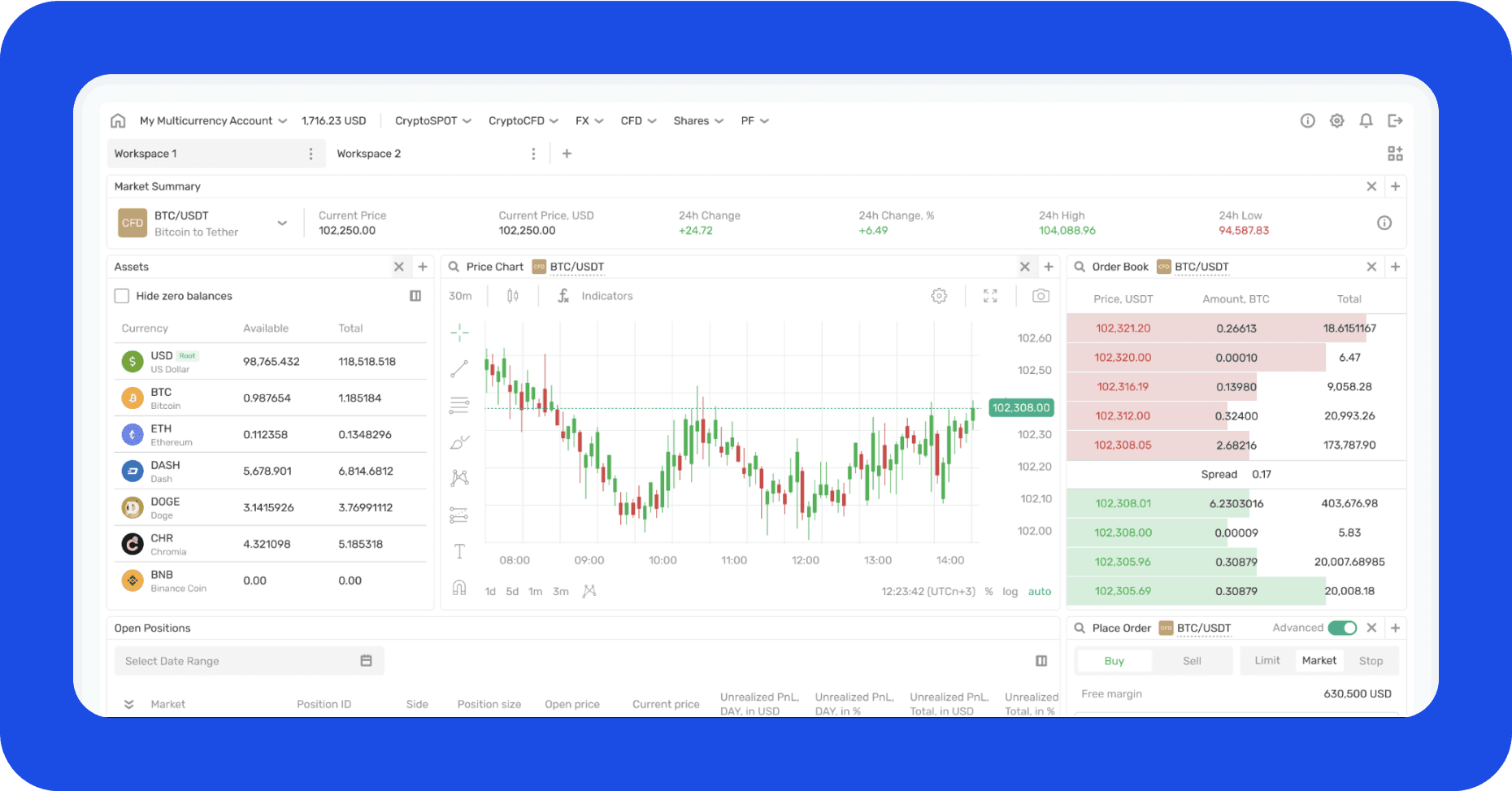
كجزء من مجموعة B2BROKER، تم تصميم B2TRADER ليكون منصة تداول متعددة الأصول مخصصة للعملات الرقمية والعقود مقابل الفروقات والفوركس. عبر حساب واحد فقط، يمكن للمستخدمين الوصول إلى مجموعة واسعة من المنتجات في كلٍّ من الأسواق الفورية وأسواق العقود الآجلة. وبفضل ميزات مثل الإدارة التبادلية للهوامش (Cross-margin)، يمكن للوسطاء إدارة المخاطر بفاعلية، كما يمكن للمتداولين تعديل تخصيص الضمانات بحرية أكبر.
يضمن شجر المعدلات الذكي (Smart Cross-Rate Tree) أفضل تسعير وتنفيذ سريع، خصوصًا للأزواج النادرة وأزواج العملات التقاطعية. توفّر آلية الرافعة المالية الديناميكية نسبًا مرنة للمساعدة في التعامل مع تقلّبات السوق. بدءًا من وسطاء الفوركس والعملات الرقمية وصولًا إلى الشركات متعددة الأصول الراغبة في توسيع عروضها، يُعد B2TRADER قابلًا للتوسّع ويتناسب مع نماذج أعمال مختلفة.
تتيح تطبيقات الجوال على نظامي iOS وAndroid التداول في الوقت الفعلي وإدارة الحسابات والتكامل السلس مع مزوّدي السيولة. كما تضمن التقنية المتطورة وصولًا موثوقًا للسيولة في أسواق المشتقات والأسواق الفورية.
يقدّم B2TRADER أدوات تداول شاملة تمكّن شركات الوساطة من الحفاظ على قدرتها التنافسية بفضل التحديثات المتكررة والميزات الإبداعية.
Match-Trader
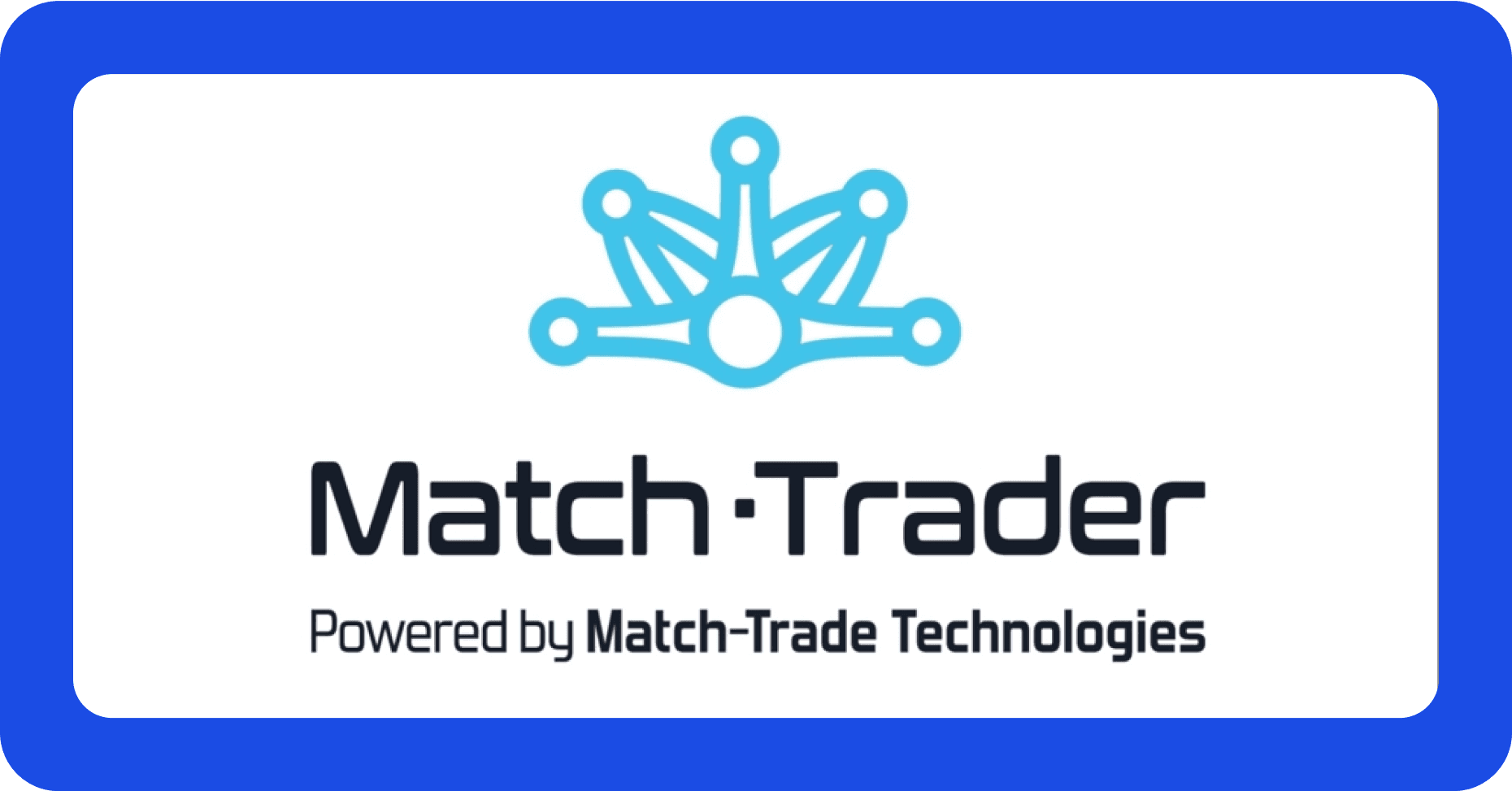
Match-Trader يوفّر حلولًا شاملة لوسطاء سوق الفوركس ومزوّدي السيولة. تدعم هذه المنصّة المعاملات بعدة عملات للشركات الدولية، كما تسهّل المالية اللامركزية (DeFi) والبورصات اللامركزية. وتشمل أبرز ميزاتها التكامل مع بدائل الدفع وأدوات التحليلات وتقنية البلوكشين المتطوّرة.
من خلال تقديم تجربة مستخدم سلسة والوصول السريع إلى السوق، يمكّن Match-Trader الشركات من جذب العملاء ويمنح الوسطاء القدرة على الاستجابة بفعالية لظروف السوق المتغيّرة.
DXtrade White Label
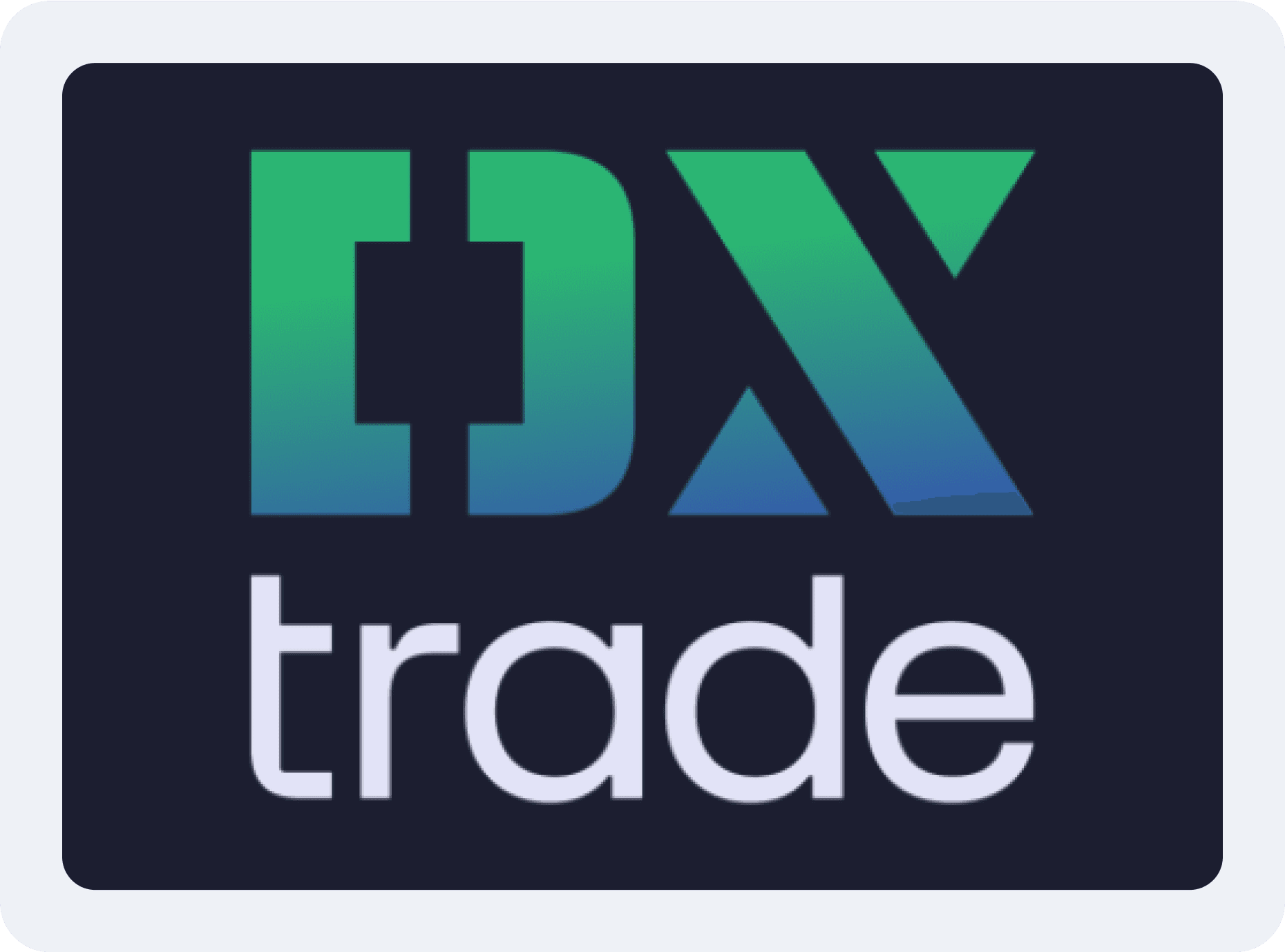
تقدّم DXtrade White Label حلولًا مخصصة للوسطاء المتخصصين في الفوركس والعقود مقابل الفروقات وتداول العملات الرقمية الفوري. توفر هذه المنصة بنية تحتية خلفية قابلة للتخصيص، ومصادقة متعددة العوامل، وأدوات للتمويل اللامركزي.
تضمن DXtrade الامتثال للأنظمة التنظيمية مع دعم أزواج التداول وتوفير السيولة. وبفضل تقنيتها المتطورة وقدراتها في تطوير البلوكشين، يمكن للشركات جذب المستخدمين ودخول مجال التمويل اللامركزي (DeFi)، مع تقديم تجربة تداول سلسة.
Leverate LXSuite
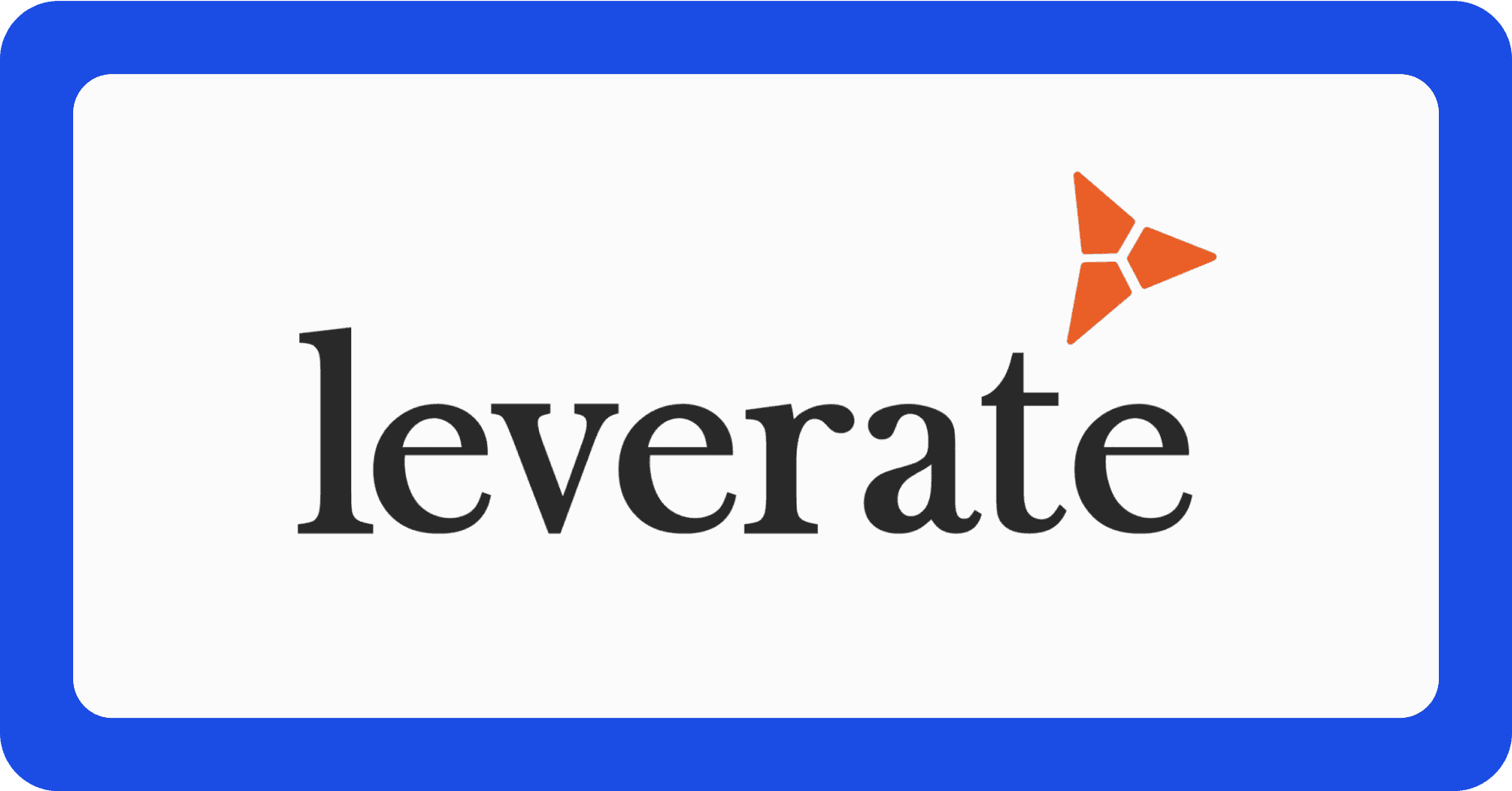
تُعد Leverate LXSuite منصة شاملة للوسطاء الجدد في سوق العملات الرقمية وللشركات الراسخة. تقدّم نظامًا متكاملًا يركّز على قدرات التداول وأدوات إدارة المخاطر وCRM.
تساعد LXSuite الوسطاء على مواءمة أهدافهم التجارية من خلال توفير موارد تعليمية ودعم لعدة عملات. يفضّلها كثيرون من الباحثين عن نهج اقتصادي لإدارة أعمالهم وإتاحة موارد مفيدة للعملاء.
إيجابيات وسلبيات استخدام حل الوايت ليبل
بفضل مجموعة كبيرة من الميزات، توفّر منصّات الوايت ليبل للشركات فرصة جاذبة للانضمام إلى السوق. تمنح هذه المنصّات الوسطاء إمكان الوصول إلى الموارد التي يحتاجونها لدخول الأسواق بسرعة، دون الحاجة إلى خبرة تقنية عميقة.
تأتي جاذبية منصّات الوايت ليبل من توفير مزوّديها ميزات أساسية، بما يشمل طرق الدفع وخيارات التخصيص والدعم المستمر.
تمنح منصّات الوايت ليبل للعملات الرقمية الشركات خيارًا مخصّصًا لتحقيق أهدافها الخاصة. وبفضل إمكانات التخصيص، يمكن للشركات مواءمة المنصة مع متطلبات علامتها التجارية واستراتيجيات التداول. وهذا الأسلوب قد يفيد الشركات التي تتطلع لجذب المستخدمين في قطاع العملات الرقمية والتمويل اللامركزي (DeFi).
تُعد منصّات الوايت ليبل شريك نمو موثوقًا للشركات الناشئة والراسخة على حد سواء. تم تصميم هذه المنصّات لتواكب نمو الشركة، مع توفير تجربة مستخدم سلسة والوصول إلى أحدث التقنيات. وتزوّد حلول المزوّدين الشركات بتركيز قوي على الأداء والكفاءة ورضا المستخدم—وهي عناصر ضرورية للاستمرار على المدى الطويل في سوق العملات المشفرة التنافسي.
كما تساعد منصّات الوايت ليبل الشركات التي ترغب في استقطاب المتداولين ذوي الخبرة وتتيح للمبتدئين اتخاذ قرارات مستنيرة. بفضل قدرتها على التكيّف السريع مع التغيّرات في السوق، يفضّل الوسطاء والشركات هذه المنصّات عند التصدّي لتعقيدات البورصات اللامركزية وقطاع العملات المشفرة الأوسع.
على الرغم من أن منصّات الوايت ليبل توفّر طريقة سريعة وسهلة لدخول السوق، هناك اعتبارات طويلة الأمد تتضمن تقييم مدى الاعتماد على مزوّدين خارجيين والحاجة إلى مزيد من التحكم في البنية التحتية الأساسية عند توسّع الشركة. ينبغي للشركات التي تهدف إلى تحقيق أهدافها الاستراتيجية في قطاع العملات المشفرة والتمويل اللامركزي أن توازن بعناية بين هذه الجوانب الجوهرية.
كيفية اختيار أفضل منصة لعملك
عند اختيار المنصة المناسبة لعملك، انتبه إلى بعض العوامل الرئيسية. ابدأ بتحديد جمهورك المستهدف واحتياجاته المحددة، سواء أكانوا عملاء مؤسسيين أم أفرادًا. ثم اختر منصّات تقدّم حلًا مخصّصًا بمجموعة ميزات واسعة تتناسب مع أهداف شركتك.
قيّم ميزانيتك والعائد المتوقع على الاستثمار لضمان توافق المنصة مع أهدافك المالية. تميل الشركات التي تبحث عن استدامة طويلة الأمد إلى تفضيل المنصّات التي تسمح بدخول سريع للسوق مع قابلية للتوسّع وخيارات تخصيص.
افحص آراء العملاء لتقييم سمعة المزوّد وأدائه في سوق العملات الرقمية المتغيّر باستمرار. غالبًا ما يوفّر أفضل المزوّدين رؤى قيّمة وتجربة مستخدم سلسة تلبي احتياجات المتداولين الخبراء وتستقطبهم.
اختر منصّات تركّز على النمو، مما يسمح للشركات بالتوسّع وفق متطلبات السوق المتجدّدة. تتميّز المنصّات التي تتيح الوصول إلى البورصات اللامركزية وقطاع التمويل اللامركزي وتدعم الأصول المتعددة بقدرتها على التكيّف مع تغيّرات سوق العملات الرقمية.
ابحث عن المنصّات التي توفّر ميزات أساسية مثل أدوات تداول متقدّمة وإدارة ديناميكية للضمانات وخيارات دفع متنوعة. تُعد هذه الخصائص ضرورية لتقديم أفضل بيئة تداول ممكنة للعملاء وضمان النجاح المستمر في السوق.
ما تكلفة منصة وايت ليبل للتداول؟
تختلف تكلفة حلول الوايت ليبل اعتمادًا على المزوّد والميزات ومستوى التخصيص المطلوب. في العادة، تتراوح الرسوم الأولية للإعداد بين 5,000 و30,000 دولار. يشمل هذا المبلغ البنية التحتية الأساسية، بينما قد تتسبب عمليات الدمج أو التعديلات الأكثر تعقيدًا في تكاليف إضافية.
أفضل 5 منصّات وايت ليبل للتداول في عام 2025
أفضل منصات وايت ليبل للتداول في عام 2025
اكتشف أفضل 5 منصّات وايت ليبل للتداول في عام 2025. تعرّف على كيفية تقديم هذه الحلول القابلة للتخصيص دخولًا سريعًا إلى السوق وأدوات متقدمة وإمكانية التوسّع.
عادةً ما تتراوح رسوم استخدام المنصّة والدعم الفني شهريًا بين 1,000 و10,000 دولار، وذلك بناءً على الخدمات المقدمة. أما في حالة الباقات الشاملة مع مزايا إضافية مثل الاستشارات التنظيمية، فقد تصل التكاليف الشهرية إلى 15,000 أو 25,000 دولار.
تُعد حلول الوايت ليبل أقل تكلفةً من تطوير منصة خاصة. قد تتجاوز تكلفة تطوير منصة داخلية 100,000 دولار، وغالبًا ما يستغرق إطلاقها عدة أشهر. في المقابل، يمكن للوسطاء الذين يعتمدون على الوايت ليبل الانطلاق في غضون أسابيع قليلة.
كما تؤثر التخصيصات والرسوم الترخيصية على التكلفة الإجمالية. عادةً ما تشمل بعض التعديلات البسيطة ضمن الحزمة، لكن التعديلات الكبيرة في العلامة التجارية أو الوظائف قد تزيد من السعر. وتختلف رسوم الترخيص باختلاف المنطقة الجغرافية؛ إذ تؤدي القوانين الأشد صرامة إلى رسوم أعلى.
توفّر حلول الوايت ليبل خيارًا أكثر جدوى من حيث التكلفة مقارنةً بإنشاء منصة خاصة تمامًا، للشركات التي ترغب في البدء بسلاسة وسرعة. وبفضل الصيانة والدعم المتواصلين من المزوّد، يمكن للوسطاء التركيز على توسيع قاعدة عملائهم، مما يسهم في تبسيط العمليات بشكل أكبر.
الخلاصة
تُقدّم منصّات الوايت ليبل للتداول خيارًا اقتصاديًا وفعالًا لدخول السوق. إذ تقلّل من التعقيد والتكاليف التطويرية، بينما توفر البنية التحتية والأدوات اللازمة لتقديم تجربة تداول سلسة.
بوسع الشركات أن تبقى تنافسية عبر اختيار منصة تدعم أهدافها، وتركّز على قابلية التوسّع، وتوفّر خيارات للتخصيص. كما تتيح الحلول التي يقدّمها أبرز المزوّدين التكيّف مع اتجاهات سوق العملات الرقمية والتمويل اللامركزي، بفضل دعمها للعناصر الأساسية مثل تغطية الأصول وبروتوكولات الأمان وقدرات التكامل.
يؤدي التقييم الدقيق لخصائص المنصّة إلى تعزيز الاستدامة والنجاح على المدى البعيد في قطاع العملات الرقمية.
الأسئلة الشائعة (FAQ)
ما هي منصة الوايت ليبل للتداول؟
تتيح منصة الوايت ليبل للشركات إضافة شعارها وتصميمها الخاص على منصة جاهزة، وتقديم الوظائف الأساسية دون علامة تجارية.
كم تبلغ تكلفة وسيط فوركس وايت ليبل؟
يبدأ وسطاء الفوركس التشغيل في غضون أسبوعين تقريبًا، وتتراوح قيمتهم بين 20,000 و50,000 دولار. أما بناء وسيط مخصص من الصفر فقد يستغرق ستة أشهر تقريبًا، ويكلّف نحو 150,000 دولار.
ما هو مفهوم الوايت ليبل؟
يتيح الوايت ليبل للشركات إعادة تسمية منتجات أو خدمات شركة أخرى وطرحها باسمها الخاص، دون الحاجة إلى بحث أو تصنيع مكثف.
اقرأ أيضًا

